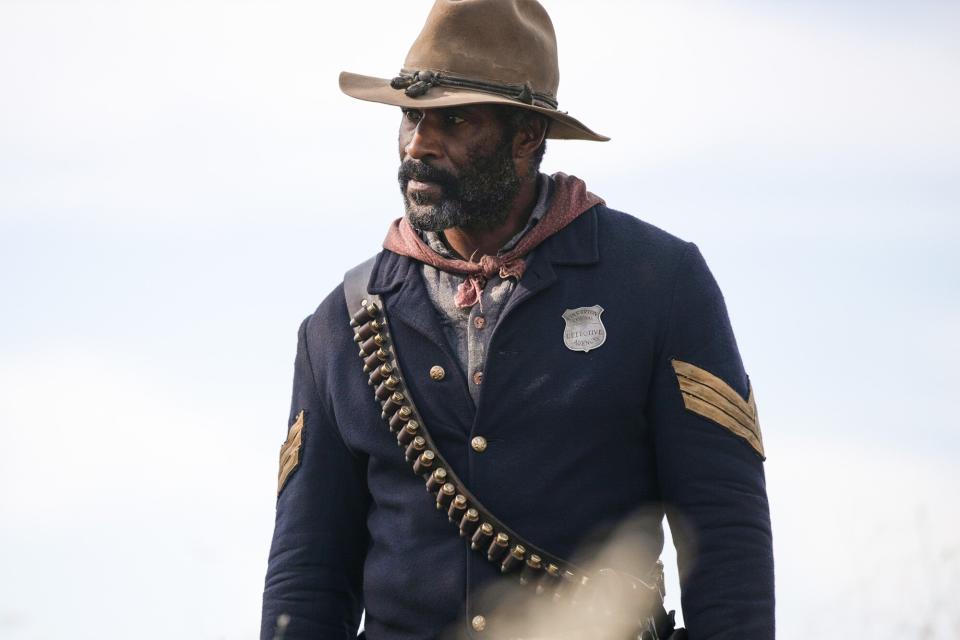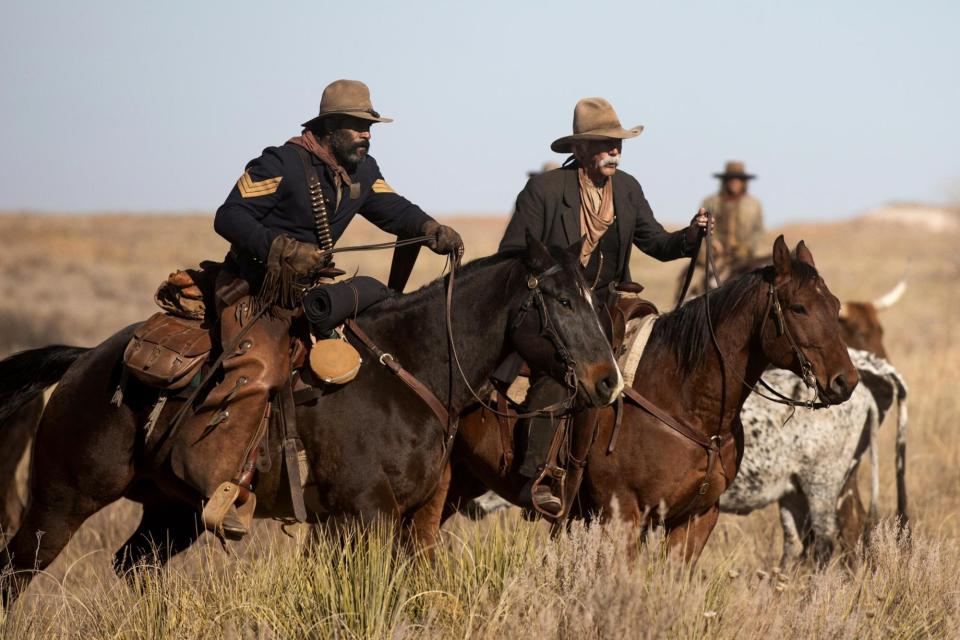LaMonica Garrett on how 1883 depicts his Old West character
- Oops!Something went wrong.Please try again later.
When LaMonica Garrett first received the script for 1883, he was pleasantly surprised to see what wasn't included in Taylor Sheridan's evocative dialogue: the N-word.
Garrett's character Thomas, a former buffalo soldier who serves as the right hand to wagon master Shea (Sam Elliott), is the only Black person participating in the arduous journey. But nowhere in the script is Thomas subjected to that word.
"That's something that jumped out at me," said Garrett (Designated Survivor, Arrow)."When we think about this time period in history, as far as film and television go, we jump from the harshness of slavery straight to the Civil Rights era with Martin Luther King and Malcolm X. There's a whole 100 years that we just don't know about. We don't know stories of what Black people did in this country throughout that time or how they were treated."
He continues, "So in this world of 1883, maybe there is another Black soldier or Black cowboy 10 miles away who was treated harshly, who might have been called the N-bomb. But in this story, you don't see that. With this little section of people, Thomas didn't go through that. He's a great character, but not a typical character that we've seen in other TV westerns. He's treated with respect and dignity, and he carries himself that way."
For the first five episodes, Thomas has been depicted as a quiet man who knows just the right time to share a pearl of wisdom — or brandish his gun. But on Sunday, viewers got to see his softer side when he decided to buy a fancy mirror for a pretty (and very lonely) widow in their wagon train. Here, Garrett talks about his biggest episode yet and what it has meant to work on location.

Emerson Miller/Paramount+ LaMonica Garrett in '1883'
ENTERTAINMENT WEEKLY: Let's talk about the widow Noemi, played by Gratiela Brancusi. My first thought was, "Where did Thomas have the money to buy her that mirror?"
LAMONICA GARRETT: Thomas and Shea both have money and live well below their means. He saw the mirror in the trading post. It hit him right at that moment that Noemi would like it. It's funny. As great as Thomas is with his riding horses and knowing the terrain and having wisdom, he's not the silver tongue, the sweet talker with women. He didn't really didn't think he'd be having this conversation [about marriage]. He just thought she would be like, "Oh, thank you for this."It was a little bit more than Thomas is used to. He was like, "Why can't you just take the gift and say 'thank you' and we can be quiet?" There's an awkwardness to him that I think is really special. The further we go, there are gonna be more of those moments. But as we have seen, things don't go too well for people on the Oregon trail when they get too happy. Happiness doesn't last too long.
How were you first hired by Taylor Sheridan?
Me and Isabel May [Elsa Dutton] have the same manager. My manager told Taylor, "You don't know it, but I have Thomas already." I'm sure Taylor's heard that from dozens of managers, of course. A handful of my buddies were talking about the project because it was huge. So we all sent in audition tapes, and Taylor called me and gave a little backstory. He wanted me to do another tape, another audition. So he gave me more backstory on Thomas, and I hired a dialect coach for the audition. When I found out I got it, three or four days later, after finishing up The Terminal List for Amazon, I was on a plane to Fort Worth, Texas, to start cowboy camp.
I love how everybody calls it cowboy camp.
That's what it is. Camp sounds fun, and it was for the first few days. We're all getting up and having breakfast together. We're riding horses. And then when your muscles start to hurt, and it's 110 degrees out, and you're up before the sun every day, then it starts feeling like work.
How did the dialect coach help you?
I told the dialect coach it took place in the late 1880s and that Thomas is a former slave from Mississippi who found his way to Texas. I also did my own research and found a present-day cowboy who just passed away in 2020. I think his name was Floyd Frank. He was a local legend in the Southeast Texas region. I heard his voice and was like, "That's the voice I want."
Thomas served for Sam Elliott's character in the Civil War, right?
Yeah, as a buffalo soldier. The buffalo soldiers were an all-Black regiment, the ninth and 10th Calgary, but they had white officers who were leading the charge, and Sam was the captain. That's why Thomas calls him captain. They kind of navigated through life together and found themselves as Pinkerton agents. Their bond just became closer over time.
Why does Thomas still wear the uniform jacket?
I think coming from where Thomas came from, he never had anything. People in that time were former slaves or slaves. Even in that time period, when you give them something, there's a sense of pride. A lot of the buffalo soldiers got secondhand horses and second-rate guns. Thomas has money, but he doesn't need much. He said he sleeps outside. He bathes in a river. He doesn't gamble. He doesn't drink. He just saves his money so he can buy new clothes. But I think the sense of pride he got from rising up to a sergeant in the buffalo soldiers, it's something he takes a huge amount of pride in.

Emerson Miller/Paramount+ LaMonica Garrett and Sam Elliott in '1883'
What's it been like on set?
This is by far the hardest job I've ever had. Ninety-five percent of the show is filmed on location, not in the studio with air conditioning or heat. It's either the hottest of Texas summers or the coldest of Montana winters. You're dealing with horses that are temperamental, or if they feel bad weather coming, they don't want to do what you're telling them to do. You're dealing with 50 longhorns. You're dealing with wagons that don't have a reverse button. So it's a lot of waiting. It really gives you a perspective of how strong human beings had to be in that time period to navigate this.
What's it been like working with Sam Elliott?
It's like working with a Hollywood icon. There are just not enough words to describe what the relationship with Sam has been like behind the camera. It got to a point where Sam, Tim McGraw, Faith Hill, Isabel, and I were all staying in the same cabin or little house. We'd come home and talk about the day and Sam would start to tell old Hollywood stories about, like, Road House and Tombstone. There were a couple of times where we would just be sitting around drinking on a Friday night and would have to wake up the next day to work, but Tim would pour Sam more whiskey just to keep him talking. We just wanted to hear more stories. We were hearing firsthand information from the icon himself. None of us took it for granted.
New episodes of 1883 drop Sundays on Paramount+.
This interview has been edited and condensed for length and clarity.
Sign up for Entertainment Weekly's free daily newsletter to get breaking TV news, exclusive first looks, recaps, reviews, interviews with your favorite stars, and more.
Related content:

